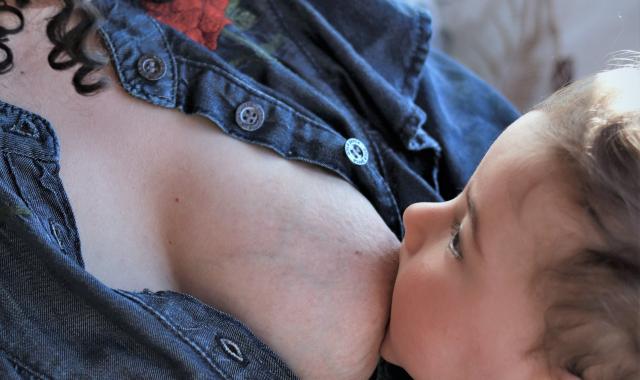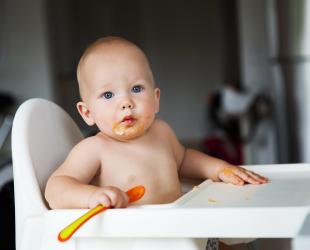Find out about breastfeeding, gluten introduction, and coeliac disease risk.

Breastfeeding is a special time for you and your baby, but when coeliac disease is involved, it’s natural to have questions and concerns.
Coeliac disease is a lifelong condition where the body can’t tolerate gluten – a protein found in wheat, rye, barley, and oats. It can develop at any age and is more likely if a family member has the disease.
Understanding the connection with breastfeeding
While your baby is exclusively breastfed, there’s no risk of them developing coeliac disease. For coeliac disease to occur, a child needs to eat enough gluten (about the amount in two slices of bread) each day. The risk only arises once you introduce solids like bread, pasta, or cereal.
If your child is diagnosed with coeliac disease, you don’t need to stop breastfeeding. In most cases, you also don’t need to remove gluten from your own diet. Breastmilk, even from a mum who eats gluten, doesn't contain enough gluten to cause symptoms or bowel damage in a breastfed child.
Recognising the signs
Some children show symptoms such as poor growth, tummy pain, unusual bowel movements, or tiredness after starting solids. If you notice these signs, talk to your doctor. Diagnosis usually involves:
- Continuing to eat gluten during testing
- Blood tests for coeliac antibodies
- A small bowel biopsy to confirm the diagnosis
Supporting your child
There’s no way to prevent coeliac disease by breastfeeding longer or by changing when you introduce gluten. However, breastfeeding has many other health benefits for both you and your child. If your child is at higher risk, you don’t need to delay introducing gluten. Just follow the usual guidelines for starting solids.
Mothers' stories
I breastfed my son, Charlie, until he was 1 year old. Charlie was diagnosed with coeliac disease by a small bowel biopsy on his second birthday. He started displaying symptoms at 18 months - constant runny bowel movements (that filled his nappies and up his back, 3-4 times a day), vomiting, very swollen tummy, lost a lot of weight and behavioural issues. We originally thought he was lactose intolerant as he started drinking more milk and it tied in, but it was that he couldn't absorb the dairy due to the coeliac disease.
I breastfed my firstborn until she was about 21 months. She was diagnosed with coeliac disease by a small bowel biopsy and blood test at age 7. The blood test also showed she had an iron deficiency. In the 6 months or so prior to the diagnosis, she complained a lot of a stomach ache, was lethargic (would come home from school and have a sleep or just lie in bed for hours) and lost weight. She also had a pattern of urinary tract infections.
In hindsight, she had symptoms of coeliac disease from about 1-2. She always had poos of an odd consistency and offensive smell, but being our first we had no idea it was not normal. She also had a huge belly as a toddler. She stopped eating bread at about aged 4.
My first child, Isabel, was breastfed for 2 ½ years and was diagnosed with coeliac disease when she was 18 months. She started showing symptoms when she was between 14-15 months old. She was really sick before she was diagnosed, 7.9kg at 18 months and losing weight. Between her showing symptoms and being diagnosed with coeliac disease, I fell pregnant. I continued to breastfed Isabel throughout the second pregnancy.
Before Isabel was finally diagnosed with coeliac disease, she was eating very little food (about one quarter of a cup per day) and jumped on for a breastfeed whenever I fed the baby (Thomas), so 3 hourly during the day, and only if she woke overnight. I continued eating gluten but as her diet hadn't changed yet she still showed symptoms. When we changed her diet to gluten free, I still ate gluten, though probably not as much.
When we changed her diet she put on remarkable amounts of weight quite quickly. So, in regards to her putting on weight and beginning to thrive, my intake of gluten had no effect. However, if I ate a lot of bread, or a large volume of gluten, her poo was quite yuck again. Of course, as she began eating food her breastfeeds were not nearly as frequent as when she was diagnosed (maybe once or twice a day).
I breastfed my eldest daughter, Daphne, until she was 2 years old. At 2 years and 5 months, after testing positive to both the blood test and bowel biopsy, she was diagnosed with coeliac disease. She had been failing to thrive, had iron deficiency and fatigue which all started once solids were introduced at 6 months, so she had coeliac disease while we were breastfeeding. Daphne is now 4 and doing reasonably well.
I breastfed my youngest daughter, June, until she was 22 months. When solids were introduced to June at 5½ months, she started failing to thrive and was constipated with hard black poos like rabbit droppings. These signs settled when gluten was removed from her diet. She received a presumptive diagnosis of coeliac disease even though her blood test can back as antibody negative (the tests are unreliable in babies).We decided to take her off gluten as an experiment and after about a week her gut improved and she started to gain weight. About 2 months later her poos went black again and she started losing weight again.
We realised about a month after that that we had inadvertently been giving her gluten in a packaged baby food. As soon as we cut this out she improved again. We found out she was positive for the coeliac disease gene and discussed this with our gastroenterologist. He recommended we keep her off gluten strictly including no gluten for me whilst I continued to breastfeed until she was bigger and stronger and we could do a gluten challenge without her getting too unwell. I was strictly gluten-free the entire time I was breastfeeding June. On the couple of occasions I messed up and ate contaminated food she would immediately get black rabbit dropping poos for about a week. It happened too many times for it to be a coincidence.
I breastfed my son, Marcus, until just before he was 24 months old (exclusively for the first 5 months). Marcus was diagnosed with coeliac disease when he was 19 months old by a coeliac screen blood test followed by a small bowel biopsy.
My maternal child nurse was concerned by Marcus's lack of growth at his 18 month check. There had also been concerns at his 12 month check as his weight gain then was very small but it was the fact that his height had also stopped increasing that prompted us to investigate further. Looking back at his growth charts, you can see he stopped putting on weight at 8 months when he was introduced to wheat.
After starting a gluten free diet, Marcus put on one kilogram in a month and his temperament improved.
I never changed my own diet. It was never discussed and I never considered that gluten could transfer into the milk. Prior to diagnosis, Marcus preferred breastmilk to any other food - he "knew" it was safe.
Marcus has since recovered his weight and height and is a similar size to what his brothers were at 3 and a half. He has also developed into a very easy going boy. He is very talkative and has a great imagination.
My daughter, Madeleine, was 18 months when diagnosed with coeliac disease and was breastfed until 12 months. Coeliac disease is in my family and my daughter is the third generation (that we know of) with it. I can't say for sure if my breastmilk affected her as I didn't experiment with a gluten-free diet myself at the time, but knowing what I know now, I personally feel it did affect her.
From day one she had awful bowel movements at every nappy change. When she started solids this continued and intensified.
Madeleine also struggled to put on weight (from birth), and at one stage lost weight, despite eating a lot and me having an abundant milk supply. She was classed as failure to thrive by about 15 months which is when I pushed for coeliac disease testing. She has always tested negative serology, but positive biopsy and gene. She is super sensitive to gluten and now vomits upon ingestion of it.
As a baby, it was common for her to have 6 to 7 poo explosions in a day, from birth right up until she commenced a gluten-free diet at 18 months. She was also a ‘spewy’ baby, fussy feeder and a poor sleeper - none of these settled until well after a gluten-free diet was established. She also always had a hard bloated tummy, that didn’t dissipate until several months after commencing a gluten-free diet. (If she accidentally ingests it now, she gets a bloated tummy virtually straight away). Other symptoms that were always there included a pale complexion, heart murmur and skin rashes. Now she is a pretty normal 3 year old, smack on 50th percentile.
Further reading
Coeliac Australia: Diagnosis and management in children Factsheet https://coeliac.org.au/learn/coeliac-disease-in-children/
The information on this website does not replace advice from your health care provider.
© Australian Breastfeeding Association January 2026
The following references informed the writing of this article:
- Silano M, Agostoni C, Sanz Y, Guandalini S (2016), Infant feeding and risk of developing celiac disease: a systematic review. BMJ Open 6(1):e009163. https://doi.org/10.1136/bmjopen-2015-009163
- Szajewska H, Shamir R, Strozyk A, et al. (2022), "Systematic review: early feeding practices and the risk of coeliac disease: a 2022 update and revision." Alimentary Pharmacology & Therapeutics, 57(1), 8-22. . https://doi.org/10.1111/apt.17290
- Meijer C, Shamir R, Szajewska H and Mearin L (2018), Celiac Disease Prevention. Front. Pediatr. 6:368. https://doi.org/10.3389/fped.2018.00368 https://www.frontiersin.org/articles/10.3389/fped.2018.00368/full#B38

